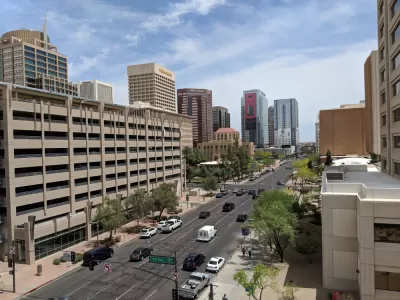An extension of the Phoenix metro region’s half-cent transportation sales tax by voters this November would give the city a green flag, and funding, to expand its use of AI as a planning tool.

Early last week, the World Economic Forum published an article on the use of AI by local governments worldwide. Just a few days later, the APM Research Lab released a piece specifically looking at Arizona’s efforts to adopt AI for city and regional planning, which will be on the ballot this upcoming November.
The full adoption of the technology is part of the prop 470, which is a 20-year extension of a half-cent sales tax that Phoenix voters first approved in 1985 and renewed in 2004. “If passed by voters, Prop 479 would set aside $12.5 million every year for emerging technologies, allowing Phoenix to maintain its status as a regional leader in technology adoption,” writes reporter Rithwik Kalale. The city of Phoenix already uses AI to adjust traffic signals in response to real-time conditions; approval of Prop 479 would allow the technology to be applied through the entire metro area, Kalale reports.
APM Research Lab’s article also highlights AI efforts in Tempe, Arizona, which adopted an ethical AI policy in 2023. Stephanie Deitrick, the chief data and analytics officer for the City of Tempe, who wrote the policy, said at a recent summit that there are a lot of drawbacks to AI and that successful policies and applications need to be people-focused and have human oversight to provide check and balances against inherent biases in the data and algorithms. “AI on its own cannot understand the social norms, cultures, or context of development in every city it is used in, especially when it comes to governance,” Kalale writes. The article concludes with an AI-generated conclusion that states: “By carefully weighing the benefits and risks, and ensuring AI is used as a complement rather than a replacement, urban planners can harness the power of AI to create smarter, more responsive cities while safeguarding community values and public trust.”

Alabama: Trump Terminates Settlements for Black Communities Harmed By Raw Sewage
Trump deemed the landmark civil rights agreement “illegal DEI and environmental justice policy.”

Planetizen Federal Action Tracker
A weekly monitor of how Trump’s orders and actions are impacting planners and planning in America.

The 120 Year Old Tiny Home Villages That Sheltered San Francisco’s Earthquake Refugees
More than a century ago, San Francisco mobilized to house thousands of residents displaced by the 1906 earthquake. Could their strategy offer a model for the present?

In Both Crashes and Crime, Public Transportation is Far Safer than Driving
Contrary to popular assumptions, public transportation has far lower crash and crime rates than automobile travel. For safer communities, improve and encourage transit travel.

Report: Zoning Reforms Should Complement Nashville’s Ambitious Transit Plan
Without reform, restrictive zoning codes will limit the impact of the city’s planned transit expansion and could exclude some of the residents who depend on transit the most.

Judge Orders Release of Frozen IRA, IIJA Funding
The decision is a victory for environmental groups who charged that freezing funds for critical infrastructure and disaster response programs caused “real and irreparable harm” to communities.
Urban Design for Planners 1: Software Tools
This six-course series explores essential urban design concepts using open source software and equips planners with the tools they need to participate fully in the urban design process.
Planning for Universal Design
Learn the tools for implementing Universal Design in planning regulations.
Clanton & Associates, Inc.
Jessamine County Fiscal Court
Institute for Housing and Urban Development Studies (IHS)
City of Grandview
Harvard GSD Executive Education
Toledo-Lucas County Plan Commissions
Salt Lake City
NYU Wagner Graduate School of Public Service





























